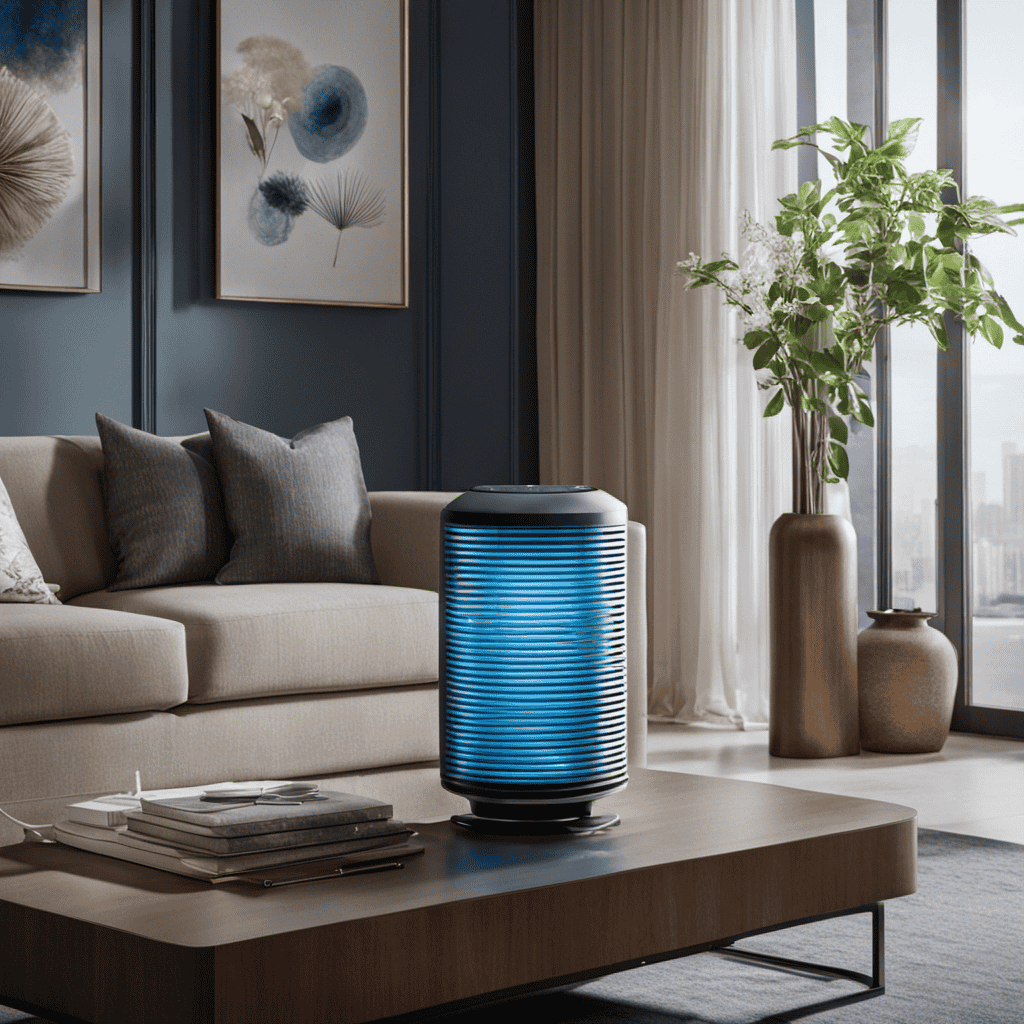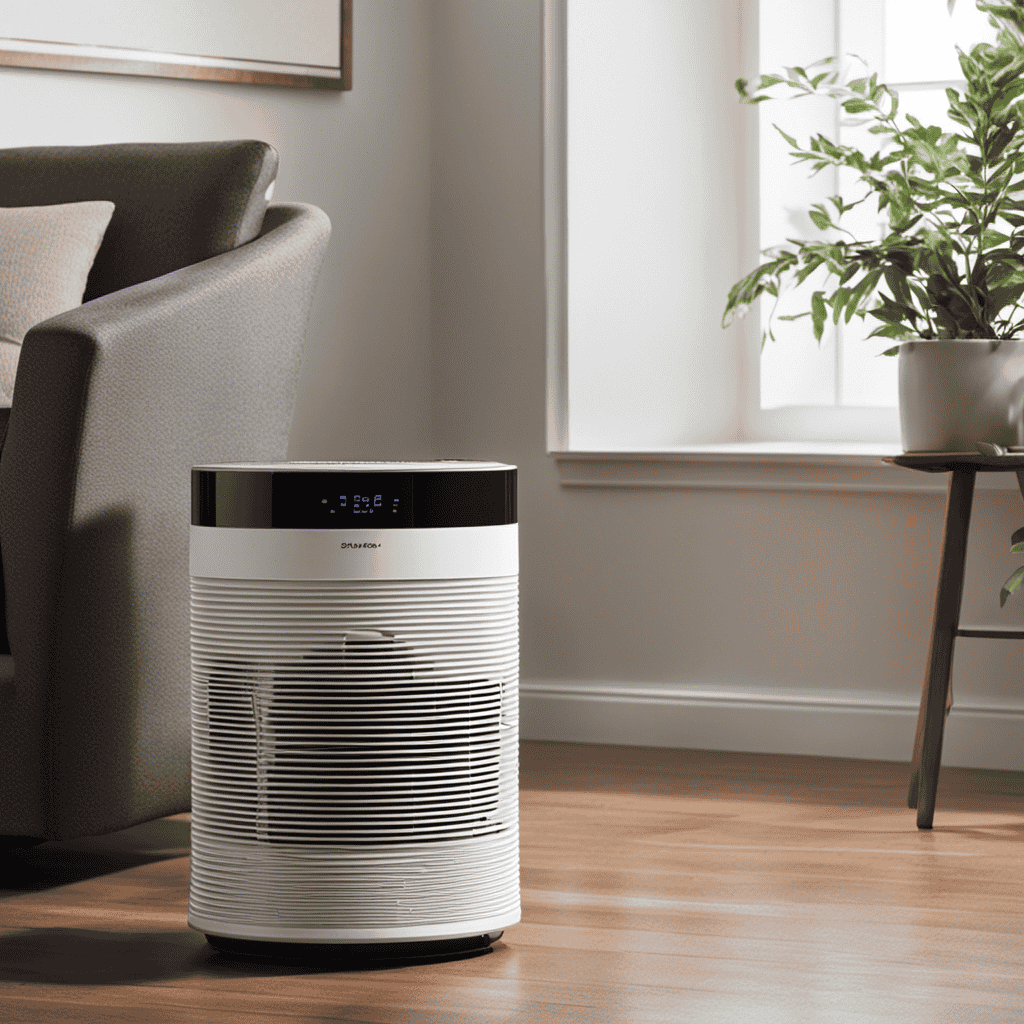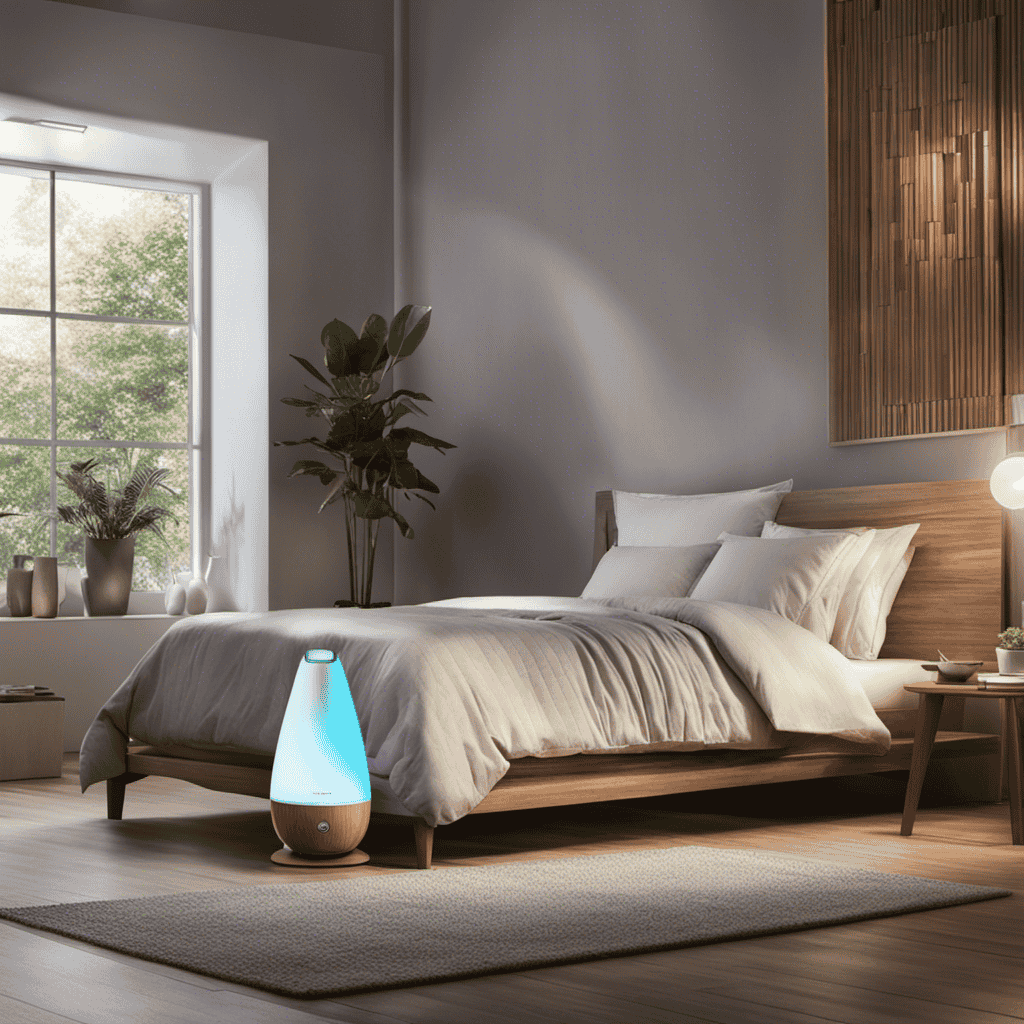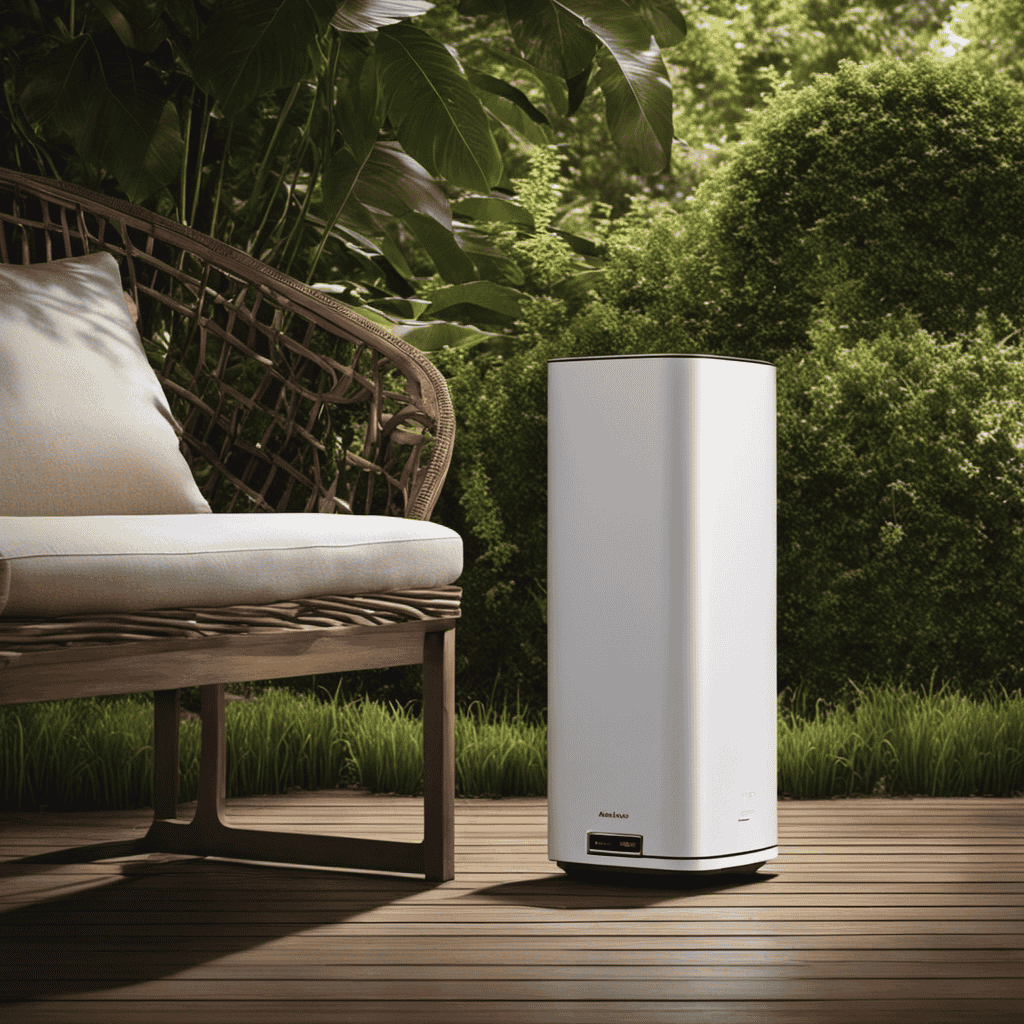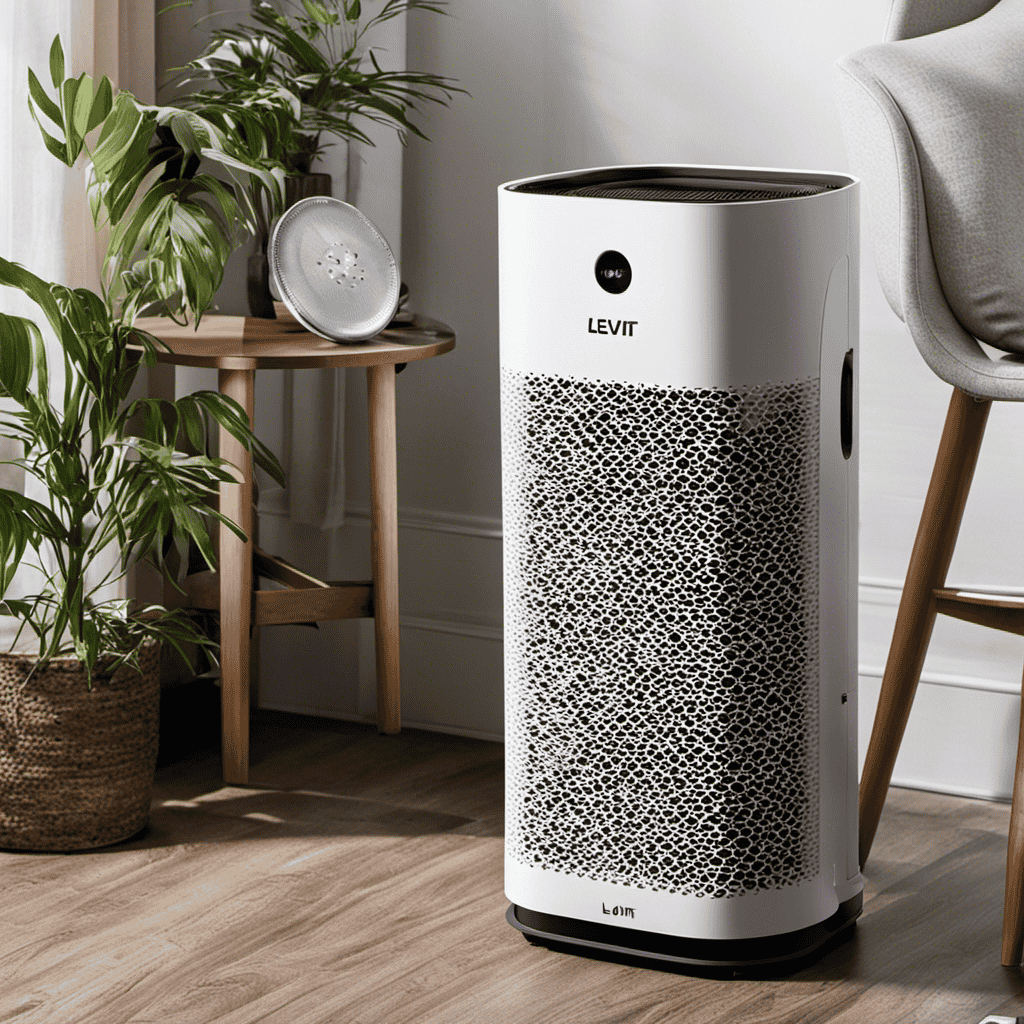As a writer, I am constantly intrigued by the newest technological developments, particularly those aimed at enhancing the air quality within my home. Therefore, upon learning about ionizer air purifiers, I couldn’t resist pondering, ‘What exactly is an ionizer air purifier?’
In this article, we will explore the fascinating world of ionizer air purifiers, how they work, their benefits, and much more.
So, if you’re like me and eager to breathe cleaner air, let’s dive in and discover the wonders of ionizer air purifiers.
Key Takeaways
- Ionizer air purifiers emit negatively charged ions into the air, which attach to positively charged particles like dust and allergens, improving indoor air quality by reducing airborne pollutants.
- Ionizer air purifiers provide immediate relief from allergies and asthma symptoms, as well as long-term health benefits by reducing the risk of respiratory diseases and improving lung function.
- There are different types of ionizer air purifiers, such as electrostatic precipitators, UV-C ionizers, and plasmacluster ionizers, each with its own pros and cons in terms of effectiveness and potential drawbacks.
- Health risks and safety considerations of ionizer air purifiers include the emission of ozone, which can cause respiratory irritation and worsen asthma symptoms, and the potential generation of harmful byproducts when reacting with certain indoor pollutants.
How Does an Ionizer Air Purifier Work
An ionizer air purifier works by emitting negatively charged ions into the air, which attach to and neutralize positively charged particles like dust and allergens. This technology, known as ionization, has several benefits in air purification.
First, it helps to improve indoor air quality by reducing the number of airborne pollutants. The ions generated by the ionizer bind to the particles and make them too heavy to remain in the air, causing them to fall to the ground or be caught by filters.
Second, ionization can help to remove odors from the air by neutralizing the odor-causing molecules. This is especially useful for eliminating unpleasant smells from cooking, pets, or smoke.
Benefits of Using an Ionizer Air Purifier
You’ll love the benefits of using an ionizer air purifier in your home.
An ionizer air purifier is a great alternative to traditional air purifiers because it not only filters out pollutants and allergens but also releases negatively charged ions into the air.
These ions attach themselves to positively charged particles in the air, causing them to become heavy and fall to the ground. This process effectively removes harmful particles from the air you breathe.
In addition to providing immediate relief from allergies and asthma symptoms, using an ionizer air purifier can also have long-term health benefits.
By removing pollutants from the air, it can help reduce the risk of respiratory diseases and improve overall lung function.
Different Types of Ionizer Air Purifiers
There are various types of ionizer air purifiers available in the market. These purifiers use ionizer technology to remove pollutants from the air, providing a cleaner and healthier environment. Let’s take a look at the different types of ionizer air purifiers and compare their features.
| Type of Ionizer Air Purifier | Pros | Cons |
|---|---|---|
| Electrostatic Precipitators | – Effectively remove large particles – Low maintenance |
– Can produce ozone as a byproduct – Not as effective for smaller particles |
| UV-C Ionizers | – Kill bacteria and viruses – Odor elimination |
– Not as effective for dust and allergens – May require frequent bulb replacement |
| Plasmacluster Ionizers | – Remove a wide range of pollutants – Reduce odors |
– Higher initial cost – Ozone emission potential |
Understanding the different types of ionizer air purifiers can help you make an informed decision when choosing one for your home. Now, let’s delve into the next section and explore the ionization process in air purifiers.
Understanding the Ionization Process in Air Purifiers
When it comes to improving air quality, one important aspect to consider is ionization. Ionizers are air purifiers that use the process of ionization to remove pollutants from the air.
By emitting negatively charged ions, ionizers can attract and neutralize harmful particles, such as allergens and bacteria, leading to cleaner and healthier indoor environments.
The benefits of ionizers go beyond just removing pollutants, as they can also help to reduce odors and improve overall air freshness.
Ionization and Air Quality
If you’re concerned about improving your indoor air quality, an ionizer air purifier can be a great option. Ionization is a process used in air purifiers to remove pollutants from the air. Here’s how it works:
-
Ionization: Ionizers release negatively charged ions into the air, which attach to positively charged particles like dust, allergens, and smoke. This causes the particles to become heavy and fall to the ground or attach to surfaces, effectively removing them from the air.
-
Indoor pollution: Indoor air pollution can be a major problem, especially for those with respiratory health issues. Common indoor pollutants include dust, pet dander, pollen, mold spores, and volatile organic compounds (VOCs) from cleaning products and furniture.
-
Respiratory health: Ionizer air purifiers can help improve respiratory health by reducing the number of airborne pollutants. This can reduce symptoms of allergies, asthma, and other respiratory conditions, allowing you to breathe easier and have a healthier living environment.
Benefits of Ionizers
Using an ionizer can greatly enhance the air quality in your home. Ionizers are designed to remove harmful particles and pollutants from the air, improving respiratory health and reducing the risk of indoor air pollution.
These devices work by emitting negative ions into the air, which attach to positively charged particles like dust, pollen, and smoke, causing them to become heavy and fall to the ground. This process effectively removes these particles from the air, reducing their concentration and improving overall air quality.
By reducing the levels of airborne pollutants, ionizers can help alleviate symptoms of allergies, asthma, and other respiratory conditions. They are especially beneficial for individuals who spend a lot of time indoors or live in areas with high pollution levels.
Ionizers are a valuable addition to any home, providing a cleaner and healthier environment for you and your family.
Key Features to Look for in an Ionizer Air Purifier
When it comes to choosing an ionizer air purifier, there are two key features that should be considered.
Effective allergen removal is crucial for those who suffer from allergies or asthma. The purifier should be able to remove allergens such as dust, pollen, and pet dander from the air.
However, it is also important to be aware of ozone emission concerns. Some ionizer air purifiers can produce ozone, which can be harmful to our health when present in high levels.
Effective Allergen Removal
An ionizer air purifier can effectively remove allergens from the air. With its advanced technology, it helps improve indoor air quality by eliminating airborne pollutants that can trigger allergies.
Here are two ways an ionizer air purifier can effectively remove allergens:
-
Ionization: The purifier releases negatively charged ions into the air. These ions attach themselves to allergens like dust, pollen, and pet dander, making them heavy and causing them to fall to the ground or be caught in the purifier’s filter. This process effectively reduces the number of allergens in the air.
-
Filters: Ionizer air purifiers often come with specialized filters that can capture even the smallest airborne particles. These filters are designed to trap allergens and other pollutants, ensuring the air you breathe is clean and allergen-free.
With an ionizer air purifier, you can enjoy cleaner air and breathe easier, especially if you suffer from allergies or have sensitive respiratory systems.
Ozone Emission Concerns
To address your concerns about ozone emissions, it’s important to consider the potential impact on indoor air quality and your health. Ozone is a harmful gas that can be emitted by certain air purifiers, particularly those equipped with ionizers. While ionizers are designed to remove particles from the air, they can inadvertently produce ozone as a byproduct. High levels of ozone can pose significant health risks, such as irritation of the respiratory system, exacerbation of asthma symptoms, and even lung damage. To mitigate these risks, ozone emission regulations have been put in place to limit the amount of ozone produced by air purifiers. It is crucial to choose an air purifier that complies with these regulations and prioritize your health by minimizing ozone exposure.
| Pros | Cons |
|---|---|
| Effective at removing particles from the air | Can produce ozone as a byproduct |
| Helps improve indoor air quality | Ozone exposure can lead to health issues |
| Can reduce allergy and asthma symptoms | Ozone emission regulations must be considered |
| Some models offer additional features such as odor elimination | Requires regular maintenance and filter replacement |
| Can be a cost-effective long-term solution | Not suitable for individuals with respiratory conditions |
The Importance of Clean Air in Your Home
Breathe easier and improve the air quality in your home with an ionizer air purifier. As someone who values the importance of indoor air quality, I have discovered the numerous health benefits of clean air. Here are a few reasons why having clean air in your home is vital:
- Reduces respiratory issues: Clean air helps alleviate symptoms of asthma and allergies, making breathing easier and improving overall respiratory health.
- Enhances sleep quality: Breathing in clean air promotes better sleep, allowing you to wake up refreshed and rejuvenated.
- Boosts immune system: Clean air helps strengthen your immune system, reducing the risk of illness and keeping you healthier.
Common Contaminants Removed by Ionizer Air Purifiers
Clean air is crucial for maintaining a healthy living environment. Ionizer air purifiers are effective devices that can help remove common contaminants from the air we breathe.
One of the main pollutants that ionizer air purifiers can eliminate is pet dander. As pet owners, we love our furry friends, but their dander can cause allergies and respiratory issues. Ionizers work by emitting negatively charged ions that attach themselves to pet dander particles, making them heavy and causing them to fall out of the air.
Additionally, ionizer air purifiers are also effective at removing cigarette smoke. The ions generated by these devices neutralize the odors and harmful particles associated with smoking, helping to improve indoor air quality.
Ionizer air purifiers offer a convenient and efficient way to combat these common contaminants and ensure that the air we breathe is clean and fresh.
Are Ionizer Air Purifiers Safe for Everyone
Using ionizer air purifiers is generally safe for most individuals, but it’s important to consider potential risks and precautions for certain groups of people. Here are some important points to keep in mind:
-
Effectiveness of Ionizer Air Purifiers
-
Ionizer air purifiers work by releasing negatively charged ions into the air, which attach to positively charged particles like dust, allergens, and pet dander. This causes these particles to become larger and heavier, making it easier for them to be trapped by filters or fall to the ground.
-
However, it’s worth noting that ionizer air purifiers may not be as effective in removing gases, chemicals, or odors from the air. For these types of pollutants, other types of air purifiers may be more suitable.
-
Potential Health Risks
-
While ionizer air purifiers are generally safe, they do produce a small amount of ozone as a byproduct. Ozone is a gas that can irritate the respiratory system and worsen asthma symptoms. Individuals with respiratory conditions or sensitivities to ozone should exercise caution when using ionizer air purifiers.
-
Additionally, some ionizer air purifiers may generate harmful byproducts, such as formaldehyde, when reacting with certain indoor pollutants. It’s important to choose a reputable brand and regularly maintain the purifier to minimize these risks.
Comparing Ionizer Air Purifiers to Other Types of Air Purifiers
When comparing ionizers to other types of purifiers, it’s important to consider their effectiveness in removing different types of pollutants from the air.
Ionizer air purifiers use an electrical charge to create negative ions, which attach to airborne particles and cause them to fall to the ground or stick to surfaces. This can be effective in removing certain types of pollutants, such as dust, pollen, and pet dander.
However, ionizers may not be as effective in removing smaller particles like bacteria and viruses. On the other hand, HEPA air purifiers use a physical filter to trap particles as small as 0.3 microns, making them more effective at capturing a wider range of pollutants.
Activated carbon air purifiers, on the other hand, are designed to remove odors and chemicals from the air.
When choosing the right ionizer air purifier for your needs, it’s important to consider the size of the room, the level of pollutants present, and any specific concerns you may have, such as allergies or asthma.
Tips for Choosing the Right Ionizer Air Purifier for Your Needs
After comparing ionizer air purifiers to other types, it’s time to focus on choosing the right ionizer air purifier for your needs.
There are several factors to consider when selecting an ionizer air purifier:
-
Room Size: Determine the square footage of the room where you plan to use the purifier. This will help you choose the appropriate size and capacity.
-
Air Quality Concerns: Identify specific air quality issues you want to address, such as allergies, asthma, or odors. Look for ionizers with additional features like HEPA filters or activated carbon filters to tackle these concerns.
-
Allergies: If you suffer from allergies, consider an ionizer air purifier with a HEPA filter that can capture small particles like pollen or pet dander.
-
Odors: For odor elimination, choose an ionizer air purifier with an activated carbon filter that can effectively remove smells from the air.
Maintaining and Cleaning Your Ionizer Air Purifier
To keep your ionizer air purifier functioning properly, make sure to regularly clean the filters and remove any accumulated dust or debris. Cleaning the filters is essential for maintaining the efficiency and performance of your air purifier. Here are some cleaning techniques and a maintenance schedule to help you keep your ionizer air purifier in top condition:
| Cleaning Techniques | Maintenance Schedule |
|---|---|
| Vacuum the filters | Weekly |
| Wash filters with mild soap and water | Monthly |
| Replace filters if necessary | Every 6-12 months |
| Wipe down the exterior of the purifier | Weekly |
| Clean the ionizing wires with a soft brush | Every 3 months |
Following this maintenance schedule will ensure that your ionizer air purifier continues to provide clean and fresh air for you and your family. Regular cleaning will help prolong the lifespan of your purifier and maintain its effectiveness in removing allergens and pollutants from the air.
The Role of Filters in Ionizer Air Purifiers
Regularly cleaning the filters is essential for maintaining the efficiency and performance of your ionizer air purifier. Filters play a crucial role in trapping and removing airborne particles, ensuring that the air you breathe is clean and healthy.
Here are a few reasons why regular filter maintenance is important:
-
Longevity: By keeping the filters clean, you can extend the lifespan of your ionizer air purifier, saving you money in the long run.
-
Efficiency: Clogged filters can hinder the airflow and reduce the effectiveness of the ionizer, compromising its ability to remove pollutants.
-
Indoor air quality: Regular maintenance ensures that the filters can effectively capture dust, pollen, pet dander, and other allergens, improving the overall air quality in your home.
Can Ionizer Air Purifiers Help With Allergies and Asthma
Using an ionizer air purifier can greatly alleviate symptoms of allergies and asthma. These devices work by emitting negatively charged ions into the air, which bind with positively charged particles like dust, pollen, and pet dander, causing them to become too heavy to remain airborne and fall to the ground.
This helps to reduce the amount of allergens in the air and can provide relief for those with respiratory conditions. Studies have shown that ionizer air purifiers can be effective in reducing asthma symptoms, such as wheezing and shortness of breath.
However, it is important to note that long-term exposure to high levels of ozone, a byproduct of ionization, can be harmful to human health. It is recommended to use ionizer air purifiers in well-ventilated areas and to follow the manufacturer’s instructions to minimize any potential risks.
Energy Efficiency and Ionizer Air Purifiers
Ionizer air purifiers can help reduce energy consumption by operating on low power settings. This is beneficial not only for your electricity bill but also for the environment. Here are some reasons why ionizer air purifiers are energy efficient:
- They utilize advanced technology that requires less power to operate compared to traditional air purifiers.
- They have adjustable settings, allowing you to choose the power level that suits your needs, further reducing energy consumption.
By opting for an energy-efficient ionizer air purifier, you can minimize your environmental impact and contribute to a more sustainable future. Considering the significant amount of time we spend indoors, it’s essential to have an air purifier that not only improves air quality but also conserves energy.
Considerations for Placing Your Ionizer Air Purifier in Your Home
When choosing where to place your ionizer air purifier, consider the size of the room and the proximity to potential sources of pollutants. Placement considerations are important to ensure optimal positioning for the best air purification results.
Firstly, determine the size of the room to determine the appropriate size and power of the ionizer air purifier. A larger room may require a more powerful unit to effectively clean the air.
Additionally, consider the proximity to potential sources of pollutants such as kitchen areas, smoking areas, or areas with high levels of dust or pet dander. Placing the ionizer air purifier close to these sources will help to capture and neutralize pollutants more effectively.
Remember to also avoid placing the unit near obstacles or furniture that can obstruct the airflow and reduce its efficiency.
Is There a Difference Between an Ionizer Air Purifier and a Regular Air Purifier?
Yes, there is a difference between an ionizer air purifier and a regular air purifier. The main difference lies in their method of purification. While regular air purifiers use filters to trap particles, ionizer air purifiers release negatively charged ions to attach to and remove impurities from the air. Ionizer air purifier benefits include the ability to neutralize odors and remove allergens effectively.
Frequently Asked Questions
Can Ionizer Air Purifiers Help With Allergies and Asthma?
Ionizer air purifiers can help with allergies and asthma by removing airborne particles and allergens from the air. Research has shown that ionizers can effectively reduce symptoms and improve air quality.
How Energy Efficient Are Ionizer Air Purifiers?
As an expert, I’ll shed light on the energy efficiency of ionizer air purifiers. They consume less energy compared to other types, reducing environmental impact. Now let’s dive into the specifics of their efficiency.
What Are the Considerations for Placing an Ionizer Air Purifier in Your Home?
When considering where to place an ionizer air purifier in your home, it is important to take into account factors such as room size, airflow, and proximity to sources of pollution. Additionally, regular maintenance is necessary to ensure optimal performance.
Are Ionizer Air Purifiers Safe for Everyone?
Ionizer air purifiers can be safe for most people, but individuals with respiratory conditions, such as asthma, should exercise caution. It’s important to prioritize indoor air quality and consider potential health risks before using an ionizer air purifier.
How Do Ionizer Air Purifiers Compare to Other Types of Air Purifiers?
When comparing ionizer air purifiers to other types, it is important to consider their effectiveness. Ionizers use ions to remove particles from the air, while HEPA filters physically trap them.
Conclusion
In conclusion, an ionizer air purifier is a remarkable device that utilizes the power of ions to cleanse the air we breathe. By releasing negatively charged ions into the environment, it attracts and neutralizes harmful particles, providing us with cleaner and fresher air.
With various types and key features to consider, finding the perfect ionizer air purifier for your needs is essential. Additionally, these purifiers can potentially aid in alleviating allergies and asthma symptoms while being energy-efficient.
So, consider placing one in your home for a healthier living environment.
